Amir Ghasemkhani
Robust Event Classification Using Imperfect Real-world PMU Data
Oct 19, 2021



Abstract:This paper studies robust event classification using imperfect real-world phasor measurement unit (PMU) data. By analyzing the real-world PMU data, we find it is challenging to directly use this dataset for event classifiers due to the low data quality observed in PMU measurements and event logs. To address these challenges, we develop a novel machine learning framework for training robust event classifiers, which consists of three main steps: data preprocessing, fine-grained event data extraction, and feature engineering. Specifically, the data preprocessing step addresses the data quality issues of PMU measurements (e.g., bad data and missing data); in the fine-grained event data extraction step, a model-free event detection method is developed to accurately localize the events from the inaccurate event timestamps in the event logs; and the feature engineering step constructs the event features based on the patterns of different event types, in order to improve the performance and the interpretability of the event classifiers. Based on the proposed framework, we develop a workflow for event classification using the real-world PMU data streaming into the system in real-time. Using the proposed framework, robust event classifiers can be efficiently trained based on many off-the-shelf lightweight machine learning models. Numerical experiments using the real-world dataset from the Western Interconnection of the U.S power transmission grid show that the event classifiers trained under the proposed framework can achieve high classification accuracy while being robust against low-quality data.
Event Cause Analysis in Distribution Networks using Synchro Waveform Measurements
Aug 25, 2020
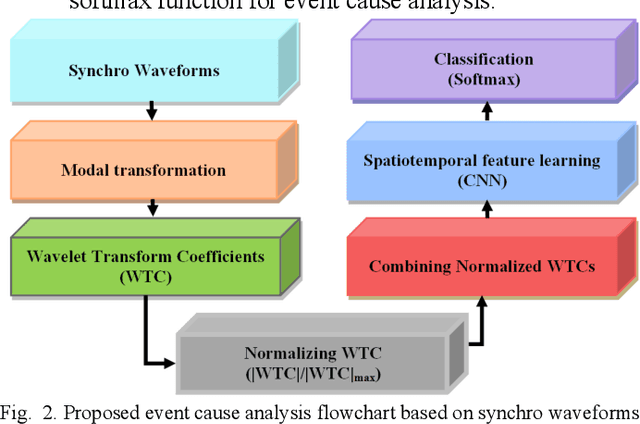
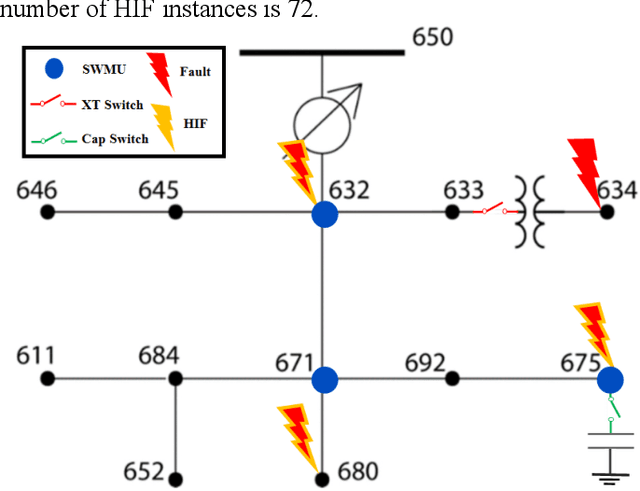
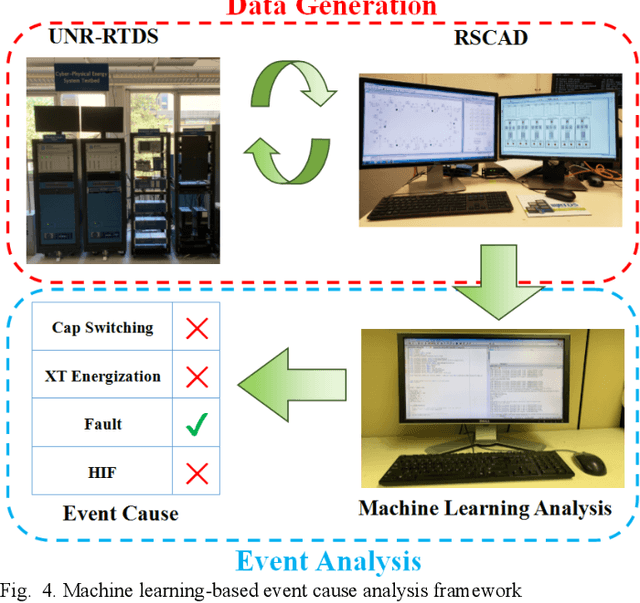
Abstract:This paper presents a machine learning method for event cause analysis to enhance situational awareness in distribution networks. The data streams are captured using time-synchronized high sampling rates synchro waveform measurement units (SWMU). The proposed method is formulated based on a machine learning method, the convolutional neural network (CNN). This method is capable of capturing the spatiotemporal feature of the measurements effectively and perform the event cause analysis. Several events are considered in this paper to encompass a range of possible events in real distribution networks, including capacitor bank switching, transformer energization, fault, and high impedance fault (HIF). The dataset for our study is generated using the real-time digital simulator (RTDS) to simulate real-world events. The event cause analysis is performed using only one cycle of the voltage waveforms after the event is detected. The simulation results show the effectiveness of the proposed machine learning-based method compared to the state-of-the-art classifiers.
Deep Neural Network based Wide-Area Event Classification in Power Systems
Aug 24, 2020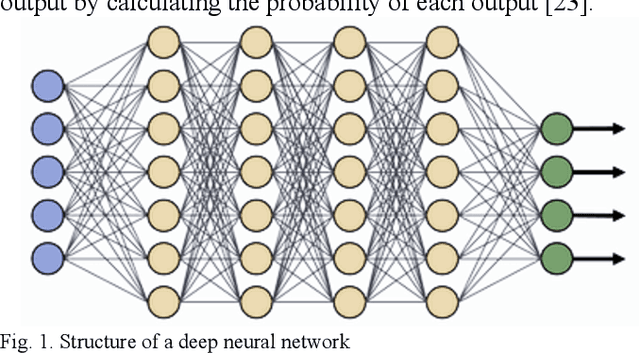
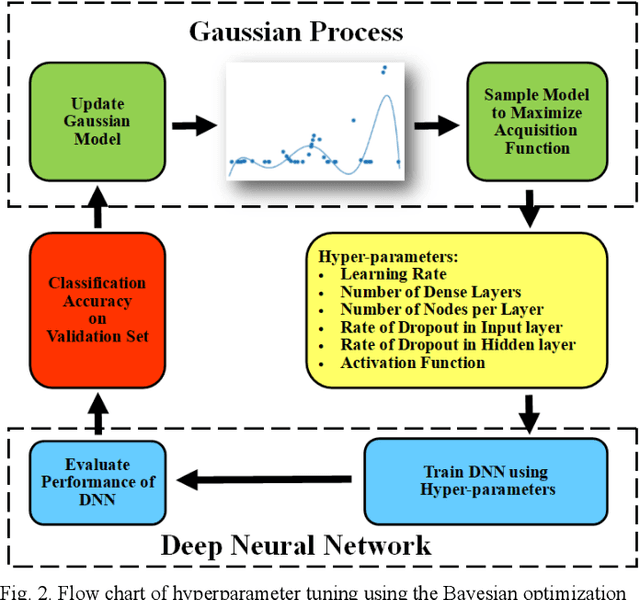
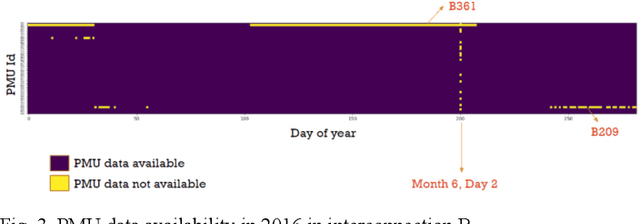
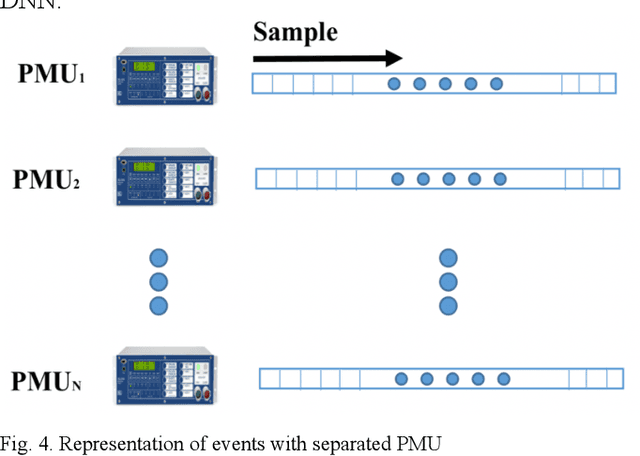
Abstract:This paper presents a wide-area event classification in transmission power grids. The deep neural network (DNN) based classifier is developed based on the availability of data from time-synchronized phasor measurement units (PMUs). The proposed DNN is trained using Bayesian optimization to search for the best hyperparameters. The effectiveness of the proposed event classification is validated through the real-world dataset of the U.S. transmission grids. This dataset includes line outage, transformer outage, frequency event, and oscillation events. The validation process also includes different PMU outputs, such as voltage magnitude, angle, current magnitude, frequency, and rate of change of frequency (ROCOF). The simulation results show that ROCOF as input feature gives the best classification performance. In addition, it is shown that the classifier trained with higher sampling rate PMUs and a larger dataset has higher accuracy.
Adaptive Intelligent Secondary Control of Microgrids Using a Biologically-Inspired Reinforcement Learning
May 02, 2019



Abstract:In this paper, a biologically-inspired adaptive intelligent secondary controller is developed for microgrids to tackle system dynamics uncertainties, faults, and/or disturbances. The developed adaptive biologically-inspired controller adopts a novel computational model of emotional learning in mammalian limbic system. The learning capability of the proposed biologically-inspired intelligent controller makes it a promising approach to deal with the power system non-linear and volatile dynamics without increasing the controller complexity, and maintain the voltage and frequency stabilities by using an efficient reference tracking mechanism. The performance of the proposed intelligent secondary controller is validated in terms of the voltage and frequency absolute errors in the simulated microgrid. Simulation results highlight the efficiency and robustness of the proposed intelligent controller under the fault conditions and different system uncertainties compared to other benchmark controllers.
 Add to Chrome
Add to Chrome Add to Firefox
Add to Firefox Add to Edge
Add to Edge